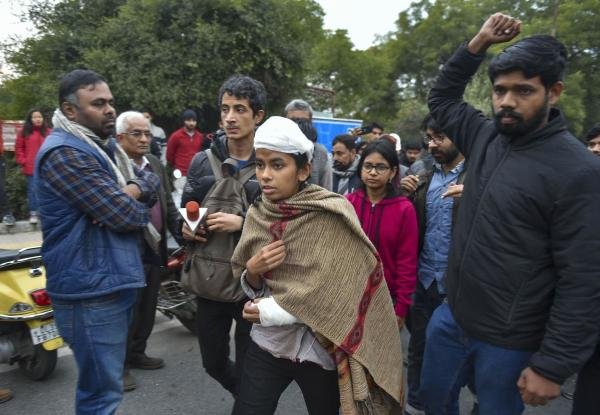New Delhi: The police have collected dump data of mobile phones of people from campus to identify the culprits behind the Sunday’s assault on the JNU students, officials said Wednesday.
Police said that several students have come forward to share information regarding the incident Sunday after police made a public appeal requesting people to share information, footage and video clips relating to the incident.
“Many students contacted on the given number and came forward to share details of the attack but when asked if they would be able to identify those involved in the attack, they said they would not be able to identify them,” a senior officer said on condition of anonymity.
Even some of the teachers with whom crime branch officials spoke to said it would be difficult for them to identify those involved in the violence, the officer said.
Among those who have come forward to share information regarding the incident, no one has shared any mobile footage that they shot themselves during the attack, he said.
Police said they have spoken to the wardens and students of the Periyar and Sabarmati hostels in connection with the incident.
Among the 34 people injured in the probe, police have only been able to record statements of few since most of them have still not returned to their hostels.
So far, statements of over 100 people, including students, teacher and staff, have been recorded in connection with the probe, he said.
The officer said they also sent text message to JNUSU president Aishe Ghosh, but have not been able to record her statement yet.
Ghosh has submitted a complaint to Vasant Kunj (North) police station stating that one of her attackers was not wearing a mask and she can identify him. She also alleged that some students and a professor had threatened her a day before the incident saying they will “see her”.
Police have also collected dump data of the mobile phones active in the locations in connection with the probe, the official said, adding they have also sought details of SOS calls made to the PCR to probe the incident.
The police have received 11 complaints, including one lodged by a professor in connection with the violence in JNU January 5, police said.
Out of these, one complaint has been lodged by a professor while the other complaints have been lodged by the students, they said.
Teams of both the crime branch and forensic science laboratory (FSL) have visited the campus.
According to an FSL official, the cyber forensic and photo teams will be visiting JNU on Thursday to collect more evidence.
According to sources, around 2 pm on Sunday, there was a gathering of students inside the campus. While the ABVP students gathered near Vivekananda statue at the varsity, those from the Left gathered near the Jawaharlal Nehru statue.
While getting dispersed, there was a scuffle between the two groups.
Later at around 3.45 pm, the police control room (PCR) received the first call from Periyar hostel. The call was responded immediately and the policemen deployed at the admin block following the high court direction was sent to the spot, the sources said.
At Periyar Hostel, some people, with batons in hand, were seen. They attacked some students. However, the group did not enter the hostel. Around 17 PCR calls were received from Periyar hostel till around 4.15 pm, the sources said.
After dispersing the crowd, the police personnel returned to the admin block of the varsity, according to the sources.
However, around 5-5.15 pm, a senior officer of DCP rank entered the campus. He went to the Periyar hostel and inspected the situation. He returned to the main gate of the university after ensuring that the situation was normal, the sources said.
After the incident at the Periyar hostel, the main gate of JNU varsity is closed and no one is allowed entry and while the police was deployed at the north gate of the varsity, they said.
The sources said the Vasant Kunj North police station incharge and 20 officials from each station of the district were called in to maintain law and order.
The police again received a PCR call around 5.30-5.45 pm about 700 people entering the university. The police personnel deployed at the admin block were sent again, but they did not find any gathering. When the PCR was called back the caller, the mobile phone of the caller was found to be switched off, the sources said.
According to the sources, the students, most of them belonging to the ABVP, disrupted a peace march of the JNUTA at the T-point of Sabarmati hostel.
After disrupting the march, the group entered the Sabarmati hostel and vandalised the gates and windows. In the meantime, the students from the Left group mobilised leading to a scuffle, the sources said.
At around 6.45, the JNU vice-chancellor sent a message urging police to increase the police deployment at the main gate of the varsity as the situation in the campus could become tense, the sources said.
Later, at around 7.30-7.45pm, police received a written letter from the JNU administration to intervene but by the time police intervened, the mob had already dispersed. All the scuffle and violence took place in campus between 7 and 7.30 pm, the sources said.
The JNUSU president was taken to the ambulance by the DCP from the east gate of the varsity.
PTI
